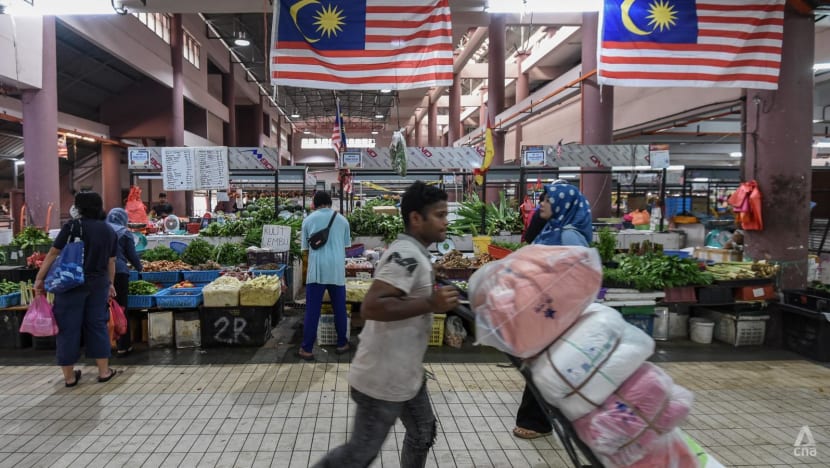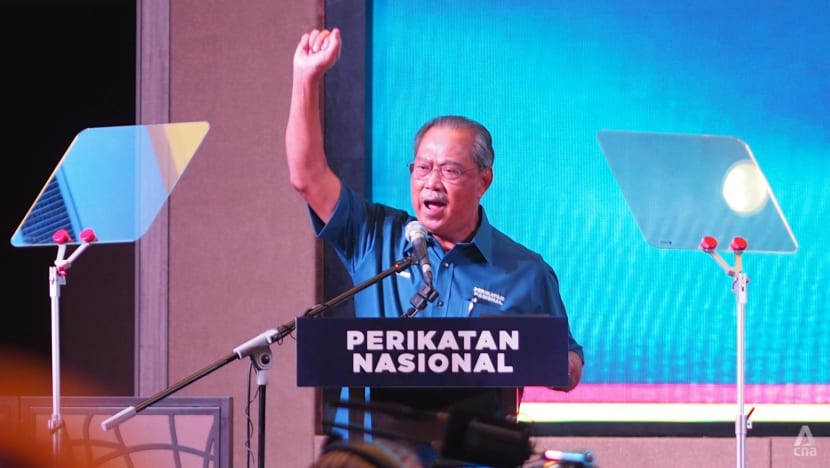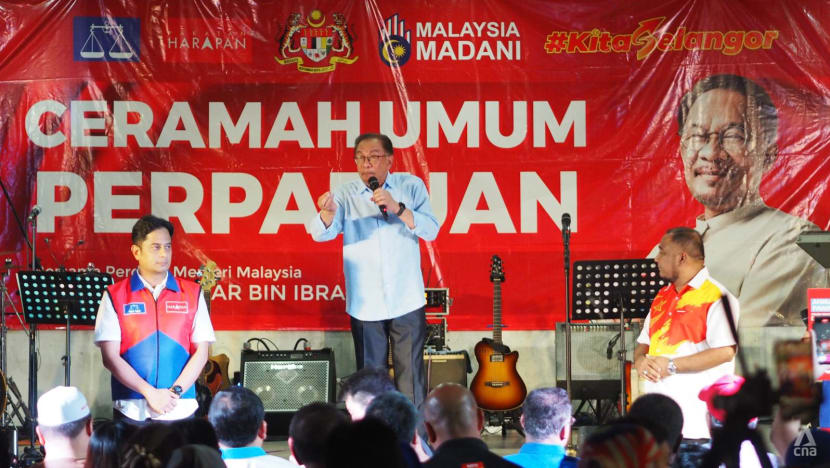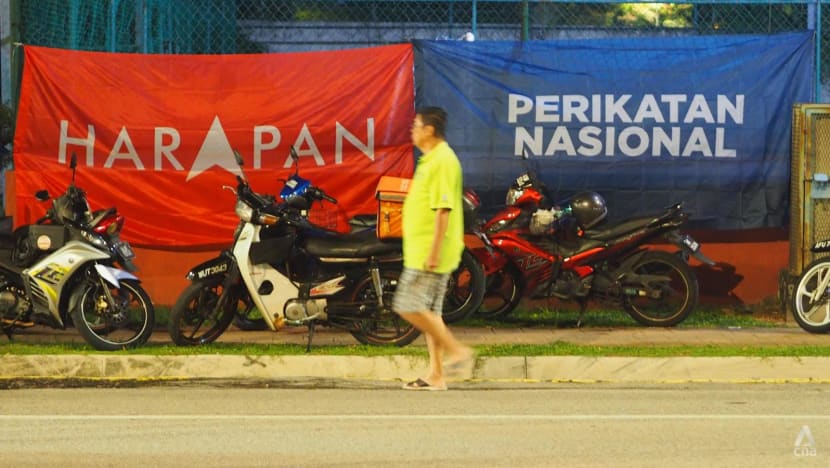Malaysia state polls: Anwar’s economic policies under fire but unlikely to be affected by election results, say analysts

A scene from the wet market in Klang, Selangor. (Photo: CNA/Fadza Ishak)
SELANGOR: A keen follower of the political scene in Malaysia, 38-year-old voter Ahmad Farizul tries to attend as many political rallies as possible during the campaign period for the state polls to get a sense of what is going on.
The Kuang resident in the state of Selangor considers himself to be a fence-sitter and could vote for any coalition or even an independent candidate.
At almost every political rally, the sales executive observed politicians from both sides of the aisle speak about the rising cost of living and make promises to solve this by creating new jobs, reducing inflation and raising incomes at the same time.
“Sometimes I feel that both sides are saying the same thing. The only difference is they claim to be better and cleaner than the other side,” Mr Ahmad told CNA at a Perikatan Nasional (PN) event on Aug 5.
Both the unity government and opposition coalitions have been making economic issues a key focus of their campaigns amid rising inflation and cost of living.
While the opposition said the state polls are a referendum on the unity government, political observers and economists believe that the government can still carry out its economic policies regardless of the election results.
Residents from six states - Selangor, Kelantan, Terengganu, Negeri Sembilan, Kedah and Penang - will vote for 245 lawmakers in the state assemblies on Aug 12.
Kelantan, Terengganu and Kedah are under the rule of the Parti Islam Se-Malaysia (PAS), which is a member of the opposition PN coalition together with Parti Pribumi Bersatu Malaysia (Bersatu) and Parti Gerakan Malaysia (Gerakan).
Selangor, Negeri Sembilan and Penang are under the Pakatan Harapan (PH) coalition which leads the current unity government.
PH is for the first time working with former rivals Barisan Nasional (BN) in the polls, which come about eight months after federal elections resulted in a hung parliament.

UNITY GOVERNMENT NOT DOING ENOUGH: PN
During campaigning, PN chairman Muhyiddin Yassin repeatedly accused the unity government of not doing enough in their eight months of power to stimulate the economy and help people cope with the rising cost of living.
“A big reason for this is the incompetence of the federal government and the current state government to offer effective and comprehensive solutions to the problems faced by the people,” he said during the coalition’s launch of its Selangor manifesto on Aug 4.
Mr Muhyiddin also claimed that many businesses have had to fold because of a lack of support from the government while the depreciating ringgit and the raising of the overnight policy rate (OPR) have been a burden to the people.
“It is unsurprising that they have been labelled a ‘kakistocracy’, that is a government that is being run by a prime minister and ministers who are incompetent,” added the former prime minister.
Kakistocracy is a Greek word which means a government that is run by the least suitable people.
In its Selangor manifesto, PN vowed to create 100,000 jobs and to attract more investment into the state among other things.
Selangor is Malaysia’s biggest economic contributor, contributing 25.5 per cent of the national GDP last year.
Related:
Mr Muhyiddin also claimed that the Madani economy framework that was launched on Jul 27 by Prime Minister Anwar Ibrahim failed to provide a plan to stimulate and heal the economy holistically.
In unveiling the framework, Mr Anwar said its aim was to make Malaysia an economic leader in Asia while ensuring that people benefit from the wealth equitably.
He added that Malaysia has been caught in a vicious cycle of high costs, low wages, low profits, as well as a lack of competitiveness resulting in income increases not matching economic surges.
Some of the aims of the policy were for Malaysia to be among the world’s top 30 largest economies in less than 10 years and to implement reforms so that the country can be ranked among the 12 best economies in terms of competitiveness and ease of doing business.
However, former Selangor chief minister Azmin Ali told CNA on Jul 5 that the economy is not able to grow when the ringgit was weak.
The ringgit is currently valued at RM4.58 to the US dollar, slipping by 8 per cent from a value of RM4.24 in early February.
“The imports are getting more expensive. If you look at the percentage of our imports, the major items are intermediate groups, quality raw materials and machines. We can’t import them because they are so expensive,” he said.
Mr Azmin, a former economic affairs minister, also said that the government should stop its “flip-flop” policies.
“The moment you say publicly in parliament that you are okay with adopting flip-flop policies, they will shy away from Malaysia. They shouldn’t say that. It was very unbecoming to say that,” he said, referring to Mr Anwar who said in June that the government was ready to flip-flop for the benefit of the people.
Listen:

MADANI FRAMEWORK NOT AIMED AT WINNING VOTES: MINISTER
Economic Affairs Minister Rafizi Ramli said that the unity government took seven months to come up with the Madani economy framework.
“The framework is not to win votes but is to convince investors that our plans are good and are not populist. Not plans that are wishful thinking but are honest with the problems that we face,” he said during a political rally on Aug 2.
On his part, Mr Anwar has also been playing up the RM25 billion (US1.09 billion) pledge of foreign direct investments by German semiconductor manufacturer Infineon at the Kulim High-Tech Park in Kedah.
At a political rally on Aug 6, the prime minister said that a representative from the company had raised concerns about Malaysia’s stability and the rise of extremists in the country.
“They had several questions. First of all, if the government was stable. I told them it was, and that God-willing, if I am healthy, with the other parties, there will be no problem for me to be here for five years,” he said, adding that he gave the company a draft of his economic framework.

STATE POLL OUTCOME UNLIKELY TO DISRUPT ECONOMIC POLICIES: ANALYSTS
Economist Anthony Dass observed that the unity government’s focus was on addressing economic issues through the Madani economy framework.
He said that as a trading nation, Malaysia is exposed to external shocks but that well-structured policies would help the country ride it out.
“At the end of the day, what the business community wants is a stable government with clear-cut policies,” he said, adding that the policy's impact will take time to yield positive results.
Mr Dass believes that regardless of the outcome of the state polls, the unity government can continue to implement its policies although if polling results did not favour them, the collaboration between the federal and state governments might experience slowdowns.
Similarly, political analyst Dr Awang Azman Awang Pawi of Universiti Malaya said that the unity government still holds a majority at the federal level and that the results of the state polls should not have any bearing on this.
“The Madani economic framework is seen to have gotten the support of the three states they hold. In the other three states, the framework is seen as an effort to penetrate through to the voters there,” he said.

CHANCE TO PROPOSE ECONOMIC REFORMS
According to the think tank Center for Market Education (CME), the state elections are a good opportunity to propose economic reforms that may be beneficial to the country.
CME CEO Carmelo Ferlito said on Aug 8 that the level of public debate on economic reforms had dropped after the hype died down from Malaysia’s general election last year.
She said that the implementation of policies inspired by populistic reasons, such as the removal of the Goods and Services Tax (GST), has been detrimental to Malaysia.
Ms Ferlito added that she hopes the elections would be a chance for Mr Anwar and the unity government to promote a brave reformist agenda, and that the election outcome will allow them to pursue that agenda.

















